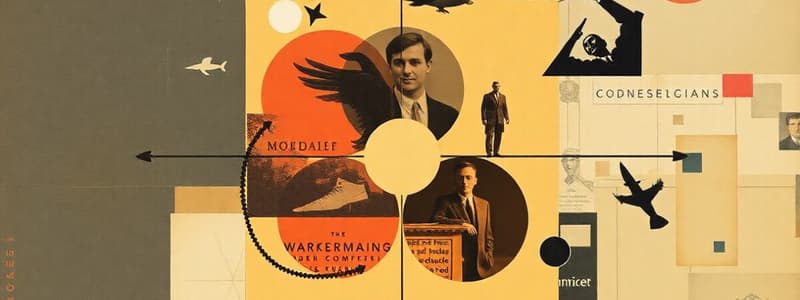Podcast
Questions and Answers
Which of the following is a primary focus of Trait-and-Factor Theory in career counseling?
Which of the following is a primary focus of Trait-and-Factor Theory in career counseling?
- Matching client’s personality with workplace culture
- Matching client’s traits with job requirements (correct)
- Exploring clients' childhood experiences
- Focusing on the client's work-life balance
In PEC Counseling, what does 'correspondence' refer to?
In PEC Counseling, what does 'correspondence' refer to?
- The relationship between career aspirations and real-world opportunities
- The alignment between work values and personal goals
- The communication style of the client
- The fit between the individual's needs and the work environment’s ability to meet those needs (correct)
In Holland's RIASEC model, what type of personality prefers tasks involving hands-on activities and working outdoors?
In Holland's RIASEC model, what type of personality prefers tasks involving hands-on activities and working outdoors?
- Artistic
- Realistic (correct)
- Investigative
- Enterprising
Which factor in Social Cognitive Career Theory is central to predicting career outcomes?
Which factor in Social Cognitive Career Theory is central to predicting career outcomes?
According to Super’s theory, which stage focuses on career exploration and gaining new experiences?
According to Super’s theory, which stage focuses on career exploration and gaining new experiences?
In Trait-and-Factor Theory, what is a major criticism regarding its approach to career counseling?
In Trait-and-Factor Theory, what is a major criticism regarding its approach to career counseling?
When using PEC Counseling, a client expresses dissatisfaction due to job expectations not matching their skill level. What should the counselor consider next based on PEC principles?
When using PEC Counseling, a client expresses dissatisfaction due to job expectations not matching their skill level. What should the counselor consider next based on PEC principles?
A client with high scores in Investigative and Artistic personalities in Holland's model is likely to succeed in which of the following environments?
A client with high scores in Investigative and Artistic personalities in Holland's model is likely to succeed in which of the following environments?
A client with low self-efficacy beliefs is struggling to commit to a career path. According to SCCT, what intervention would be most effective in helping this client?
A client with low self-efficacy beliefs is struggling to commit to a career path. According to SCCT, what intervention would be most effective in helping this client?
In Super’s Life-Span, Life-Space Theory, what role does 'career adaptability' play in the mid-career Maintenance stage?
In Super’s Life-Span, Life-Space Theory, what role does 'career adaptability' play in the mid-career Maintenance stage?
In which year did Frank Parsons, considered the father of vocational guidance, establish the foundation of Trait-and-Factor Theory?
In which year did Frank Parsons, considered the father of vocational guidance, establish the foundation of Trait-and-Factor Theory?
Holland’s theory, widely known as the RIASEC model, was first introduced in which year?
Holland’s theory, widely known as the RIASEC model, was first introduced in which year?
Donald Super’s theory of career development, known for its life-span, life-space model, was introduced in which decade?
Donald Super’s theory of career development, known for its life-span, life-space model, was introduced in which decade?
The Person-Environment Correspondence (PEC) model, which evolved from the Minnesota Theory of Work Adjustment, was developed in which decade?
The Person-Environment Correspondence (PEC) model, which evolved from the Minnesota Theory of Work Adjustment, was developed in which decade?
Social Cognitive Career Theory (SCCT) was introduced by Lent, Brown, and Hackett in which year as a framework to explain how people form career interests and make career choices?
Social Cognitive Career Theory (SCCT) was introduced by Lent, Brown, and Hackett in which year as a framework to explain how people form career interests and make career choices?
In what year did John Krumboltz introduce the concept of Happenstance Learning Theory, emphasizing the role of chance events in career decision-making?
In what year did John Krumboltz introduce the concept of Happenstance Learning Theory, emphasizing the role of chance events in career decision-making?
Flashcards are hidden until you start studying
Study Notes
Trait-and-Factor Theory
- Focuses on matching individual traits with job requirements
- Developed by Frank Parsons in 1909
- Criticized for ignoring environmental changes and overemphasizing personality
Person-Environment Correspondence (PEC) Counseling
- Aims for a fit between individual needs and work environment's ability to meet those needs
- Developed in the 1970s based on the Minnesota Theory of Work Adjustment
- When a client experiences dissatisfaction due to a mismatch between job expectations and skills, PEC principles suggest exploring further training options
Holland’s RIASEC Model
- Developed by John Holland in 1959
- Categorizes personalities into six types: Realistic, Investigative, Artistic, Social, Enterprising, and Conventional
- Individuals high in Investigative and Artistic types are likely to succeed in laboratory research environments
Social Cognitive Career Theory (SCCT)
- Introduced by Lent, Brown, and Hackett in 1994
- Emphasizes self-efficacy beliefs as a central factor in career development
- To address a client struggling with career commitment due to low self-efficacy, providing encouragement and mastery experiences can improve self-efficacy
Super’s Developmental Theory
- Introduced in the 1950s, known as the life-span, life-space model
- The Exploration Stage emphasizes gaining new experiences and exploring career options
- In the Maintenance stage, Career adaptability allows individuals to adjust to new opportunities and challenges
Studying That Suits You
Use AI to generate personalized quizzes and flashcards to suit your learning preferences.




